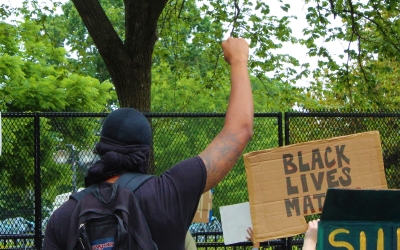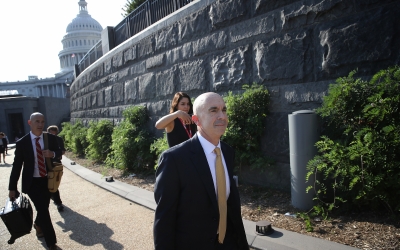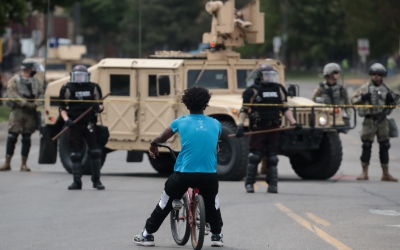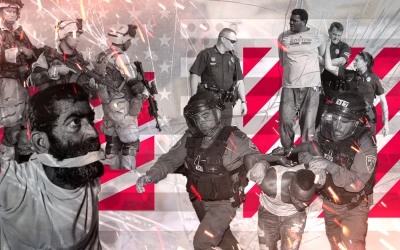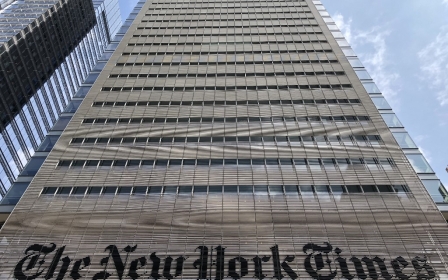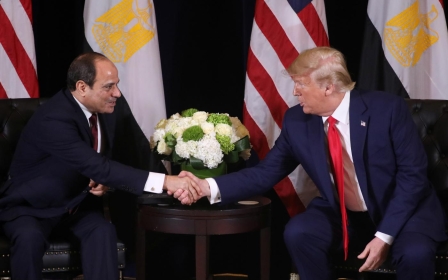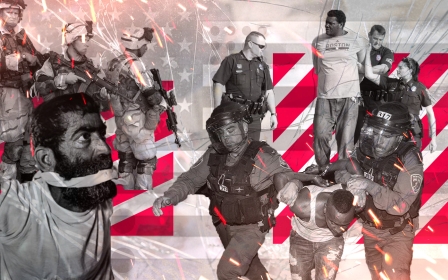Tom Cotton: Militarism at home and abroad
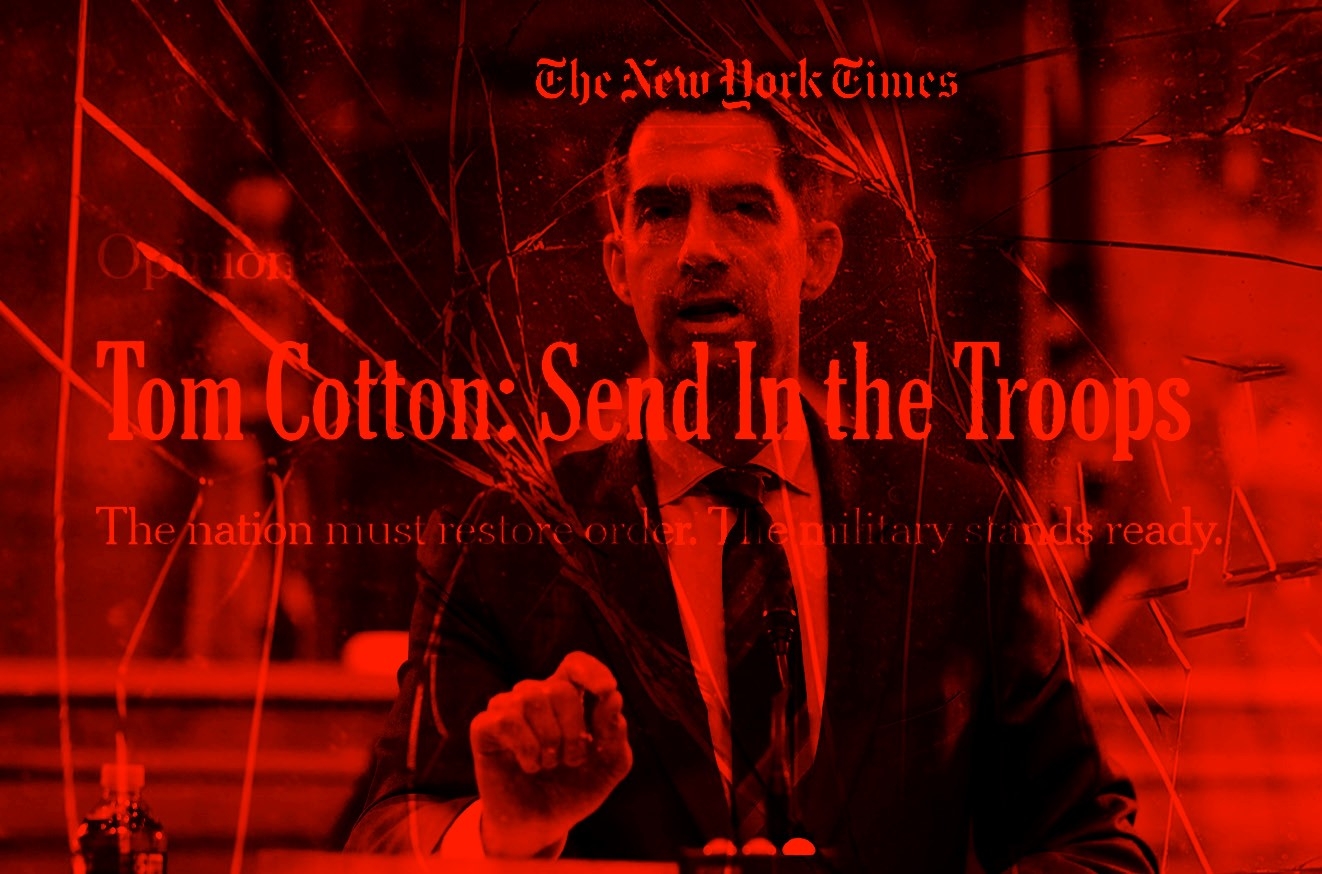
PBS journalist Margaret Hoover smirked after Senator Tom Cotton gave a resounding "Yes" when asked whether the US would win should it go to war with Iran.
"That didn't take you a second," Hoover said, referring to the senator's immediate answer during a 2019 interview.
"Two strikes: the first strike and the last strike," Cotton asserted, using military terms that describe powerful attacks that would debilitate the enemy's ability to respond.
Throughout his career in Washington, Cotton has promoted this kind of forceful use of the military abroad. This month, the Republican legislator attracted the ire of many Americans when, in a New York Times op-ed, he called for the military to be deployed on America's streets.
The column made a case for using the army to quell the nationwide protests against police brutality after a white officer killed George Floyd in Minneapolis by pressing his knee to the Black man's neck for nearly nine minutes.
In his op-ed, Cotton, a 43-year-old army veteran who fought in both Afghanistan and Iraq, said US governors should seek federal help and allow the army to deal with "rioters" and "looters".
"One thing above all else will restore order to our streets: an overwhelming show of force to disperse, detain and ultimately deter lawbreakers," he wrote.
The column caused an immediate uproar, including by NYT staffers, who argued that such rhetoric endangers people of colour across the country.
Two days after the op-ed was published, the Times admitted that it had erred by accepting Cotton's essay, saying that the column "fell short" of its journalistic standards and should have been rejected or substantially revised.
Presidential prospect
In a disclaimer that now precedes the essay, Times editors point to factual issues with the piece, including a claim by Cotton that "cadres of left-wing radicals like Antifa" have infiltrated the protests.
"Beyond those factual questions, the tone of the essay in places is needlessly harsh and falls short of the thoughtful approach that advances useful debate," the message reads.
The controversy led to the resignation of Times opinion editor James Bennet and sparked a debate about censorship, the militarisation of the police and the responsibilities of media outlets in times of crisis.
'He just thinks military force and brute strength is the way to solve any problem... and apparently now that extends to home'
- Marcus Montgomery, Arab Center Washington DC
It also shined a spotlight on Cotton, who emerged with greater name-recognition from the episode. Depending on whom you ask, he came out as a victim of liberals' attacks on conservatives' free speech, or a villain demanding military action against Black Lives Matter protesters.
That national attention led to speculations that Cotton may be positioning himself to run for president in the future.
But for some of those who have been following Cotton's career in Washington, the call for sending in the troops to deal with problems at home fits with his advocacy for military solutions abroad.
"The old adage goes: If your only tool is a hammer, you see all the problems as a nail," said Marcus Montgomery, a fellow at the Arab Center Washington DC who tracks congressional affairs.
"Tom Cotton made it crystal clear time and time again [that] he thinks military force and brute strength is the way to solve any problem the United States might face, and apparently now that extends to home."
Who is Tom Cotton?
The son of a school teacher and a local health department official from the small town of Dardanelle, Arkansas, Cotton graduated from Harvard Law School in 2002 before joining the military where he received several honours after combat tours in Iraq and Afghanistan.
After retiring from the army, he transitioned to civilian life by joining the controversial consulting group McKinsey & Co.
He was elected to the House of Representatives in 2012, and two years later, he ran successfully for the US Senate, becoming the youngest member of the legislative chamber at the time.
Cotton made his name known to the nation shortly after his ascension to the senate. In March 2015, he organised an open letter directly addressing Iran's leaders in an effort to undermine the negotiations between Tehran and then-President Barack Obama.
The unorthodox move riled Washington, sparking accusations that Cotton and the senators who signed on to his letter broke the Logan Act, a law that prohibits unauthorised citizens from intervening in US diplomatic efforts.
The letter warned Iranian leaders that if they sign a deal with Obama that does not get ratified by Congress, the agreement will be short-lived.
"The next president could revoke such an executive agreement with a stroke of a pen and future Congresses could modify the terms of the agreement at any time," Cotton wrote.
The prediction would prove to be an accurate one. The Obama administration managed to secure a multilateral deal that saw Iran scale back its nuclear programme in exchange for lifting sanctions against its economy. And President Donald Trump nixed the accord in May 2018.
Iran hawk
The Arkansas senator's early opposition to the Iran deal put him on the map as a visible advocate of hawkish policy against Tehran.
His "send in the military" op-ed was not his first byline in the New York Times. In January, the newspaper published a column he wrote praising the assassination of Iranian General Qassem Soleimani and rebuking Democrats who questioned the legality and strategic aim of the strike.
"Suleimani’s killing was justified, legal and strategically sound. But the president’s critics swarmed as usual," Cotton wrote.
In the op-ed, Cotton holds up America's flexed military muscle, concluding that Iran will be deterred by Washington's show of force in the killing of Soleimani.
"Iran is not 10-feet tall. In fact, it’s a weak, third-rate power," he wrote. The senator went on to argue that deterring and subduing Iran will benefit America in the great powers' competition with Russia and China.
"The future of our Iran policy is a critical part of our success in the global competition that will determine the character of this century and the safety of the American republic within it," Cotton wrote. "And recent events have shown we are up to the task."
Cotton has made his hawkish approach on Iran the cornerstone of his foreign policy stances early on. In 2015, he said bombing Iran's nuclear facilities would take only "several days".
More recently, the senator said Iran must "face consequences" for the attacks on Saudi oil facilities in September 2019, which had been claimed by Yemen's Houthi rebels.
Montgomery, who is from Arkansas himself, said Cotton appears to believe that the US military operates at a level of "perfection" that is unfounded in reality.
"He never really seems to engage with the worst case scenario of what happens in these situations - whether it be regime change in Iran, or bombing their nuclear facilities or deploying the military to the US streets," Montgomery told MEE.
Cotton's office did not return MEE's request for an interview.
Pro-Israel advocacy
Beyond his Iran hawkishness, the Arkansas senator has been an outspoken advocate for Israel on the Hill. Coincidentally, he has previously denounced Palestinian protesters as "rioters".
In official statements, his office makes it a point to refer to the country as "the Jewish State of Israel."
In February 2019, Cotton introduced a resolution to recognise Israel's claimed sovereignty on the Syrian Golan Heights. Trump did issue that recognition a month later in a move that violated a basic tenet of international law that prohibits the acquisition of territory by force.
Cotton was also a supporter of moving Washington's embassy in Israel to Jerusalem, reversing decades of US policy that considered the holy city to be a contested issue.
When Palestinians erupted in protests in December 2017 after Trump declared Jerusalem as the capital of Israel, Cotton blamed the Palestinian Authority for what he called "rioters".
Palestinian protesters were met by Israeli tear gas, rubber-coated steel bullets and live ammunition that killed two demonstrators.
"What today's protests show is there would be less violence in the region if the Palestinian Authority didn't promote it - whether by design or inaction," Cotton said.
"Whatever their policy disagreements with the Israeli government, the PA and Fatah have the responsibility to prevent this violence from escalating any further. And the United States will never accept a 'rioter's veto' against our policies."
Sina Toossi, a senior research analyst at the National Iranian American Council (NIAC), a Washington-based advocacy group, said staunch support for Israel is at the root of neoconservative ideology.
"They want uncompromising US global hegemony and military dominance in every corner of the world, but especially in the Middle East," Toossi told MEE.
He added that George W Bush's neoconservative top aides wanted to transform the region to make it more pro-American and safe for Israel under the guise of exporting democracy.
Cotton and Trump
While remaining a committed ally to Trump, Cotton has earned the admiration of traditional neoconservative Republicans who oppose the US president over his erratic approach to policy-making.
The political action committee of former National Security Adviser John Bolton, who was fired by Trump last September and has since spoken out against the president, has donated $10,000 to Cotton's campaign.
Cotton also has close ties to conservative columnist Bill Kristol, one of the most prominent "never Trump" Republicans. The hawkish commentator, an ardent supporter of the 2003 invasion of Iraq, is now celebrated in centrist Democratic circles over his opposition to Trump.
But in 2014, Kristol's Emergency Committee for Israel spent nearly $1m to help Cotton in his first Senate campaign, when he unseated a Democratic senator.
This time, Cotton faces an easier race. After his only Democratic rival dropped out of the race late in 2019 after filing deadline, Cotton is likely to win reelection to another six-year term in November.
Earlier this month, the Nation magazine's national affairs correspondent Jeet Heer argued that Cotton is more dangerous than Trump because of his wide appeal across the Republican base.
"If Cotton ran in 2024 or 2028, he could heal many of the wounds within the Republican Party by bringing back into the fold Never Trump neoconservatives," Heer wrote.
"This faction despises Trump for his vulgarity and disregard for policy, but would be much more attracted to a figure like Cotton, a decorated veteran who could unify the GOP with a nationalist message directed against China and Iran."
Kristol told the New York Times during Cotton's first year in office that the Arkansas senator represents a new generation of hawkish Republican lawmakers opposed to the anti-interventionist libertarianism of legislators like Kentucky's Rand Paul.
"Tom Cotton is ahead of the mainstream of Republicans on foreign policy thinking," Kristol said in 2015. "Most of those running in 2016 will sound a lot more like Cotton than Rand Paul."
The contrast between Paul and Cotton on foreign policy is stark.
The Kentucky senator helped lead opposition to the US intervention in Yemen, supported curbing the president's war-making powers and tried to block weapon sales to Gulf countries. But his Arkansas colleague has been an outspoken advocate for maintaining and strengthening the US's role in the region.
Cotton was in the minority in the Republican-controlled senate last year when he defended Trump's decision to issue an emergency declaration to finalise an arms deal with Saudi Arabia without congressional approval.
The decision, which has been the subject of an internal review in the US State Department, drew the outrage of Democrats as well as some Republicans who oppose excessive executive power.
Cotton, however, was unapologetic in defending the sale that left some of Trump's closest allies on Capitol Hill uncomfortable, dismissing his colleagues' concerns about presidential overreach.
"They're saying in effect, let's block arms sales to our allies in an emergency because the secretary of state hurt the feelings of a few senators," Cotton said during a debate on a bill to block the sales.
The proposal passed with a bipartisan majority in the House and the Senate, but it was subsequently vetoed by Trump.
Pro-Saudi stances
Cotton was one of a few senators to defend Riyadh after the murder of Jamal Khashoggi at the hands of Saudi government agents at the kingdom's consulate in Istanbul.
Less than a month after the killing of Khashoggi, a journalist who resided in the United States, Cotton warned against undermining the alliance with Saudi Arabia, which he said is based on "common interests and common adversaries".
"Although I deplore the death of Jamal Khashoggi and their consulate in Istanbul, we should not take action that's going to undermine that partnership and ultimately only empower our enemies, countries like Iran or empower countries like Russia and China," Cotton said in October 2018.
The Arkansas senator also sided with Saudi Arabia in 2017 when it announced its blockade against Qatar, accusing its tiny neighbour of funding militant groups.
Trump had stunned the national security establishment in Washington when he supported the Saudi-led sanctions against Qatar, home to the biggest US military base in the Middle East. Contradicting his own State Department and Pentagon that had called for calm, the US president endorsed the blockade and accused Doha of funding terrorism "at a very high level".
At the time, Cotton said, "Trump is right to support the Arab-led effort" against Doha.
"This situation is a strategic opportunity to seize, not a crisis to manage," he said.
"Qatar's support for terrorist organisations, especially Hamas, threatens the security of its neighbors and the United States, impedes progress toward peace in the Holy Land, and encourages malign activities by other Middle East nations."
Despite his support for Riyadh and US military interventions in the Middle East, Cotton said last year while criticising Congresswoman Ilhan Omar that Muslims ought to be grateful for America's role in their countries.
"You would think of all the people that would be grateful for America and be thankful that we stood up and protected the rights of Muslims in places like Somalia or Afghanistan or Iraq where they were going to be oppressed, it would be Ms Omar," Cotton told Fox News.
Toossi, of NIAC, said Cotton's interventionist foreign policy and his call for a military response to domestic protests are interlinked.
Global military dominance that punishes anyone who disagrees with Washington is becoming difficult to sustain while maintaining a liberal democracy in America, Toossi added.
"When you're in this kind of endless conflict and war towards this end, that necessitates a mass surveillance state, that necessitates this militarisation [at home]," he told MEE.
Middle East Eye delivers independent and unrivalled coverage and analysis of the Middle East, North Africa and beyond. To learn more about republishing this content and the associated fees, please fill out this form. More about MEE can be found here.


